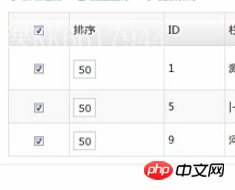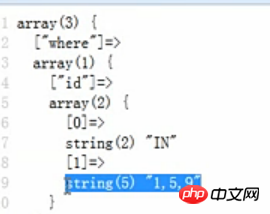ThinkPHP method to implement batch deletion of columns
This article mainly introduces the method of batch deletion of columns in ThinkPHP. Interested friends can refer to it. I hope it will be helpful to everyone.
What we need to achieve is the following effect:

After selecting the batch delete button, you can select all The column of this page is the implementation of the front-end page. I won’t go into details here. Let’s go directly to the topic: the batch deletion function.
1. There is also a small point here on the front-end page, that is, the name value of the selection box should be assigned an array of ids, and the value value is the id of the column.
2. We write a separate batch deletion method in the controller
public function privilege_bdel(){
$ids = I('ids');
$pri = D('privilege');
$ids = implode(',', $ids);
if($ids){
if($pri->delete($ids)){
$this->success('批量删除栏目成功!',U('Privilege/privilege_lst'));
}else{
$this->error('批量删除栏目失败,请重试!');
}
}else{
$this->error('未选中任何内容,请重试!');
}
}Here we need Convert the passed id array into a comma-separated string such as: 1, 2, 3, so that the delete operation can be performed directly.

This is the result of our dump options. This is also the basis for us to judge whether the deletion is a single deletion or a batch deletion. If options[where][id] If it is an array, it means that batch deletion is being performed, otherwise it is a single deletion.
3. Modification of the constructor before deletion in the model
public function _before_delete($options){
//批量删除
if(is_array($options['where']['id'])){
$arr = explode(',', $options['where']['id'][1]);
$sonpri = array();
foreach ($arr as $k => $v) {
$sonpri2 = $this->childid($v);
$sonpri = array_merge($sonpri,$sonpri2);
}
$sonpri = array_unique($sonpri);
$chilrenids = implode(',', $sonpri);
}else{//单个删除
$chilrenids =$this->childid($options['where']['id']);
$chilrenids = implode(',', $chilrenids);
}
if($chilrenids){
$this->execute("delete from ed_privilege where id in($chilrenids)");
}
}Here we write batch deletion The code (single deletion has been written before and will not be mentioned again)
Convert the passed string into an array without commas and store it in $arr, create an empty array $sonpri, and then traverse it with foreach, Here we first find all the sub-column IDs (using the childid function) and store them in the $sonpri2 array. Then we merge $sonpri and $sonpri2 into an array and use the array_merge() function to complete it. In this way, we can obtain all the sub-column IDs. Column id, but there will be many duplicate ids in the id group we obtained, so here we also need to perform a duplication operation, using the array_unique() function. Finally, split the array again to get the id string, then delete it and you're done.
Related recommendations:
PHP implementationBatch deletionjQuery operation method
ThinkPH implementationBatch deletionColumn code sharing
PHPBatch deletionjQuery instance code
The above is the detailed content of ThinkPHP method to implement batch deletion of columns. For more information, please follow other related articles on the PHP Chinese website!

Hot AI Tools

Undresser.AI Undress
AI-powered app for creating realistic nude photos

AI Clothes Remover
Online AI tool for removing clothes from photos.

Undress AI Tool
Undress images for free

Clothoff.io
AI clothes remover

Video Face Swap
Swap faces in any video effortlessly with our completely free AI face swap tool!

Hot Article

Hot Tools

Notepad++7.3.1
Easy-to-use and free code editor

SublimeText3 Chinese version
Chinese version, very easy to use

Zend Studio 13.0.1
Powerful PHP integrated development environment

Dreamweaver CS6
Visual web development tools

SublimeText3 Mac version
God-level code editing software (SublimeText3)

Hot Topics
 PHP 8.4 Installation and Upgrade guide for Ubuntu and Debian
Dec 24, 2024 pm 04:42 PM
PHP 8.4 Installation and Upgrade guide for Ubuntu and Debian
Dec 24, 2024 pm 04:42 PM
PHP 8.4 brings several new features, security improvements, and performance improvements with healthy amounts of feature deprecations and removals. This guide explains how to install PHP 8.4 or upgrade to PHP 8.4 on Ubuntu, Debian, or their derivati
 How To Set Up Visual Studio Code (VS Code) for PHP Development
Dec 20, 2024 am 11:31 AM
How To Set Up Visual Studio Code (VS Code) for PHP Development
Dec 20, 2024 am 11:31 AM
Visual Studio Code, also known as VS Code, is a free source code editor — or integrated development environment (IDE) — available for all major operating systems. With a large collection of extensions for many programming languages, VS Code can be c
 Explain JSON Web Tokens (JWT) and their use case in PHP APIs.
Apr 05, 2025 am 12:04 AM
Explain JSON Web Tokens (JWT) and their use case in PHP APIs.
Apr 05, 2025 am 12:04 AM
JWT is an open standard based on JSON, used to securely transmit information between parties, mainly for identity authentication and information exchange. 1. JWT consists of three parts: Header, Payload and Signature. 2. The working principle of JWT includes three steps: generating JWT, verifying JWT and parsing Payload. 3. When using JWT for authentication in PHP, JWT can be generated and verified, and user role and permission information can be included in advanced usage. 4. Common errors include signature verification failure, token expiration, and payload oversized. Debugging skills include using debugging tools and logging. 5. Performance optimization and best practices include using appropriate signature algorithms, setting validity periods reasonably,
 PHP Program to Count Vowels in a String
Feb 07, 2025 pm 12:12 PM
PHP Program to Count Vowels in a String
Feb 07, 2025 pm 12:12 PM
A string is a sequence of characters, including letters, numbers, and symbols. This tutorial will learn how to calculate the number of vowels in a given string in PHP using different methods. The vowels in English are a, e, i, o, u, and they can be uppercase or lowercase. What is a vowel? Vowels are alphabetic characters that represent a specific pronunciation. There are five vowels in English, including uppercase and lowercase: a, e, i, o, u Example 1 Input: String = "Tutorialspoint" Output: 6 explain The vowels in the string "Tutorialspoint" are u, o, i, a, o, i. There are 6 yuan in total
 How do you parse and process HTML/XML in PHP?
Feb 07, 2025 am 11:57 AM
How do you parse and process HTML/XML in PHP?
Feb 07, 2025 am 11:57 AM
This tutorial demonstrates how to efficiently process XML documents using PHP. XML (eXtensible Markup Language) is a versatile text-based markup language designed for both human readability and machine parsing. It's commonly used for data storage an
 Explain late static binding in PHP (static::).
Apr 03, 2025 am 12:04 AM
Explain late static binding in PHP (static::).
Apr 03, 2025 am 12:04 AM
Static binding (static::) implements late static binding (LSB) in PHP, allowing calling classes to be referenced in static contexts rather than defining classes. 1) The parsing process is performed at runtime, 2) Look up the call class in the inheritance relationship, 3) It may bring performance overhead.
 What are PHP magic methods (__construct, __destruct, __call, __get, __set, etc.) and provide use cases?
Apr 03, 2025 am 12:03 AM
What are PHP magic methods (__construct, __destruct, __call, __get, __set, etc.) and provide use cases?
Apr 03, 2025 am 12:03 AM
What are the magic methods of PHP? PHP's magic methods include: 1.\_\_construct, used to initialize objects; 2.\_\_destruct, used to clean up resources; 3.\_\_call, handle non-existent method calls; 4.\_\_get, implement dynamic attribute access; 5.\_\_set, implement dynamic attribute settings. These methods are automatically called in certain situations, improving code flexibility and efficiency.
 PHP and Python: Comparing Two Popular Programming Languages
Apr 14, 2025 am 12:13 AM
PHP and Python: Comparing Two Popular Programming Languages
Apr 14, 2025 am 12:13 AM
PHP and Python each have their own advantages, and choose according to project requirements. 1.PHP is suitable for web development, especially for rapid development and maintenance of websites. 2. Python is suitable for data science, machine learning and artificial intelligence, with concise syntax and suitable for beginners.






